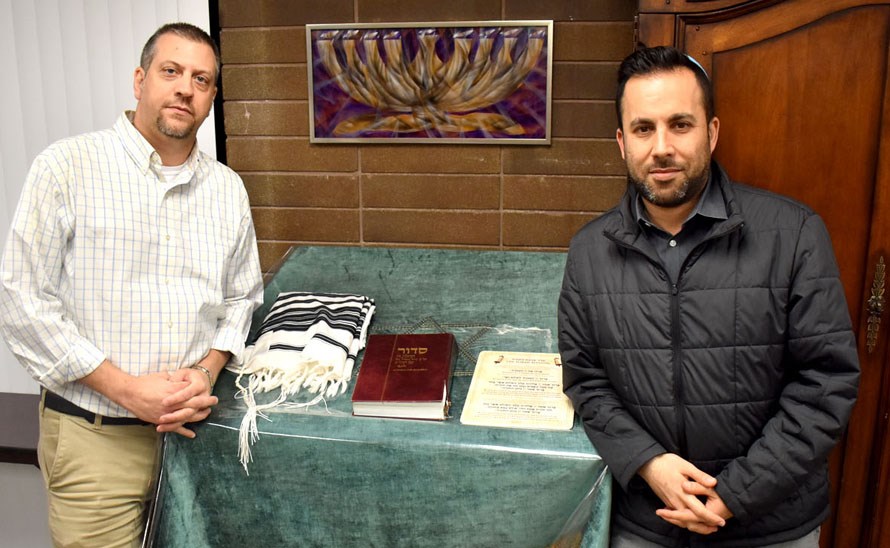“Never again” – that is what Jewish people say when they talk about the Holocaust. They don’t ever want it repeated, either to Jews or any other cultural or ethnic group.
To this end, Jan. 27 will be officially declared Holocaust Remembrance Day in Richmond.
The proclamation was made on Wednesday evening (Jan. 22) at the Bayit, the Orthodox synagogue in Steveston, by Richmond Mayor Malcolm Brodie.
Michael Sachs, past-president of the Bayit Synagogue, said it’s “extremely admirable” of the city to declare the day to remember the horrors of the past, noting that education is the key to making sure an event like the Holocaust never happens again.
“By the city making this proclamation, it’s taking a stand and making a step in the right direction of that education and awareness,” Sachs added.
The proclamation comes in the wake of a public outcry in November over a Richmond auction house that was planning to sell Nazi memorabilia including a flag with a swastika, Nazi pins and a German Luftwaffe officer’s dagger.
The auction house withdrew the items after widespread condemnation from Richmond council members, local MLAs and many community members including the Jewish community.
Richmond’s Holocaust Remembrance Day will coincide with the U.N.’s day of remembrance on Jan. 27. This year, there will be special ceremonies to mark the 75th anniversary of the liberation of Auschwitz-Birkenau concentration camp. Auschwitz-Birkenau was the largest concentration camp set up by the Nazis, located in Poland. Historians estimate 1.1 million people died there.
At about 3,800 people, Richmond has the second largest Jewish population in B.C. (after Vancouver) and many young Jewish families are settling in the city, explained Nico Slobinsky, director of the Centre for Israel and Jewish Affairs (CIJA), Pacific Region.
Slobinsky said he grew up hearing stories first-hand from survivors in his native Argentina about the Holocaust, but, world-wide, these voices are fading out. Within five to 10 years, most survivors will be gone.
“It’s really up to all of us as a collective to preserve their memory, to remember, to mark this important day of remembrance, to ensure the horrors of the Holocaust – that period of time in history – are never repeated,” Slobinsky said.
In anticipation of the city’s proclamation, Brodie pointed out anti-Semitism didn’t just rise overnight in Germany.
“It started gradually many years before with attitudes and comments and it gained momentum until anti-Semitism was a state policy – until it finally reached a climax of millions of people being slaughtered,” he said, adding that “it is always important to remember the six million mostly Jewish innocent people who perished.”
Moving forward, the community needs to emphasize its similarities, respect differences and be accepting of all groups to avoid exclusion and discrimination, Brodie explained.
In order to maintain cultural harmony, it’s important to have “constant attention and focus” to understand what happened in the past, he added.
“We have to continually renew our commitment to understanding and appreciation through education, discussion, tolerance and those concepts,” Brodie said.
Slobinsky said he’s hopeful that “we live in better times.”
Not only did six million Jews perish in the Holocaust, but other groups were also targeted – socialists, Poles, the Roma, homosexuals, and in total 11 million people perished.
And there have been other genocides after the Second World War, Slobinsky pointed out, which is why it’s so important to learn from the past “to build a better future.”
There are signs of rising anti-Semitism in the world and in Canada, Slobinsky said.
Slobinsky said standing up to racism is a moral obligation of society.
“Whenever we see signs of racism in our society, we must all just stand up and speak up against any racist behaviour against any racist incidents,” Slobinsky said. “That’s the strength of our society – when we stand together, no fear, no hate.”
Sachs calls the “Highway to Heaven,” the strip on No. 5 Road that is home to several different houses of worship for different faiths – Jewish, Muslim, Sikh, Christian, Buddhist – “unique” and credits it to having built bridges between different faith communities.
Sachs said, whenever something has happened across the globe to the Jewish community, the other faith groups on the Highway to Heaven have reached out to the Richmond Jewish community.
“The Highway to Heaven is the perfect example of co-existence and mutual support,” Sachs said.



